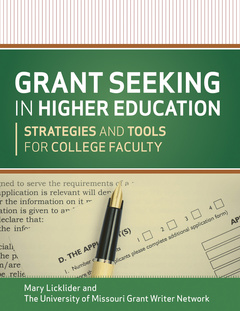Description
Grant Seeking in Higher Education
Strategies and Tools for College Faculty
Author: Licklider Mary M.
Language: English
Subject for Grant Seeking in Higher Education:
336 p. · 21.6x27.7 cm · Paperback
Description
/li>Contents
/li>Biography
/li>
Written for anyone in higher education who is responsible for submitting and running a grant-funded project, Grant Seeking in Higher Education offers a hands-on resource for developing and managing the grant process from start to finish.
Step by step, the authors will help you to identify and sort through potential sponsors, tap into campus support that is already in place, and prepare to write a targeted grant proposal that can generate results. Once you have completed the research, the book outlines the keys to writing a winning proposal, including an effective proposal narrative, thorough budget, and readable proposal package. To give grant seekers an extra edge, the book contains a toolkit of tested materials. These proven toolstemplates, examples, and cheat sheetsare designed to help you approach your project as a grants professional would.
Grant Seeking in Higher Education also spotlights the need for academic leaders to create a campuswide culture that fosters efficient and effective grant seeking.
Praise for Grant Seeking in Higher Education
"This book realistically provides great advice on proposal development and grants management. Additionally, readers receive a bonus as the authors have included some very helpful tools and templates that have assisted them in their grant endeavors." Gail Vertz, chief executive officer, Grant Professionals Association
"This book is well researched, especially with regard to issues of collaboration, helpfully organized, and chock-full of practical advicea must-have for any research development professional's bookcase!" Holly Falk-Krzesinski, founding president, National Organization of Research Development Professionals (NORDP)
List of Figures, Tables, and Boxes vii
Foreword ix
Preface: What’s in a Name? xi
Acknowledgments xv
About the Authors xvii
PART 1 THE HOW-TO MANUAL
Section 1 Diving into Grants Culture
1 Grants Culture: The Big Picture 5
2 The Matching Game: Finding Funders 17
3 Tapping Support on Campus 33
4 Collaboration: The New Frontier 43
5 Preparing to Write 55
Section 2 Developing Your Proposal
6 The Writing 71
7 The Abstract 81
8 The Heart of the Matter: The Proposal Narrative 91
9 Budgets 111
10 Making It Shine: The Proposal Package 129
Section 3 Next Steps
11 Review, Rejection, and Reshaping 149
12 Your Project Is Funded—Now What? 161
PART 2 GRANT-SEEKING TOOLKIT
Section 1 Diving into Grants Culture 179
Grant Glossary 179
Tools for Finding Funding 188
Funding Search Cheat Sheet 190
Prewriting Questions 192
Section 2 Managing the Proposal Work 197
Planning for Proposal Development 197
Developing a Concept Paper 202
Four Sentences to Focus Your Elevator Pitch 203
Contacting a Program Offi cer 204
Managing Proposal Development 206
Narrative Timeline for Proposal Development 207
Section 3 Developing Your Proposal 215
Proposal Logic 215
Moving from the Larger Context to the Detail 216
Proposal Outlines 217
Evaluation 220
Budget Justification 223
Subcontracts and Consulting Agreements 229
Sample Subcontract Scope of Work 232
Travel Expenses 233
Letters of Support and Commitment 235
Project Timelines 239
Proposal Review Processes 246
Section 4 Building Institutional Grants Culture 251
Tools for Hiring Grant Writing Consultants 251
Interview Questions 253
Interview Writing Prompts 254
Reference Check Questions 256
Tools for Managing and Nurturing Grant Writing Consultants 257
Survey Instrument 269
Flextime Memo 273
Afterword: Summing It Up 275
Appendix: Building a Grants Culture: A Word to Campus Leaders 279
References 303
Index 309
Mary M. Licklider is director of the Office of Grant Writing and Publications in the University of Missouri's (MU) Office of Research and provides leadership to MU's Grant Writer Network. Since 1998, network members have helped with nearly 2,000 grant proposals, which have encompassed a wide range of sponsors and brought grant awards of more than $304 million.
These books may interest you

Developing a Winning Grant Proposal 209.69 €



